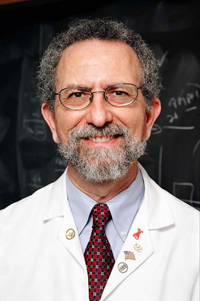 It seems like every week there’s news about the benefit of antioxidants although the information sometimes conflicts.
It seems like every week there’s news about the benefit of antioxidants although the information sometimes conflicts.
The role of antioxidants and disease prevention will be the focus of the 2009 Denham Harman, M.D., Ph.D., Lectureship in Biomedical Gerontology at UNMC on Friday, April 10. Antioxidants, which include vitamin C, E and beta carotene, are touted for their possible role in slowing the aging process and fighting heart disease, cancer, Alzheimer’s and Parkinson’s disease.
Jeffrey Blumberg, Ph.D., senior scientist and director of the antioxidants research laboratory at Tufts University in Boston, will present, “Antioxidant Nutrients and Radical Medicine: The Promise and the Puzzle.” He is recognized for research on the effects of antioxidants and their health benefits, such as vitamin C, E, and flavonoids, which are present in green tea, almonds, cranberries, blueberries, broccoli and dark chocolate.
Studies have shown that when people eat plenty of fruits and vegetables, they lower their risk of developing cardiovascular disease and stroke.
The lecture, sponsored by the UNMC Department of Internal Medicine, will be held at noon in the Durham Research Center Auditorium and is open to the public. Lunch will be provided for the first 200 attendees.
 |
Jeffrey Blumberg, Ph.D. |
The center explores the relationship between nutrition, aging and health by determining the nutrient requirements necessary to promote health and well-being for older adults and examining the degenerative conditions associated with aging.
Dr. Blumberg has published more than 230 scientific articles and serves on the editorial boards of several scientific journals. He also participates in activities incorporating sound nutrition science into public health policy and has served as a member of the Surgeon General’s Workshop on Health Promotion and Aging, and the Sports Medicine Committee of the U.S. Olympic Committee.
The Harman Lecture is named for Denham Harman, M.D., Ph.D., the Emeritus Millard Professor of Medicine at UNMC, who is known internationally as the father of the Free Radical Theory of Aging, which he proposed in 1954.
Dr. Harman’s theory is one of the most well-known and respected theories on the aging process. He proposed that free radicals — highly reactive molecules freed in the normal chemical processes — cause aging and disease through their destructive actions in cells and tissues.
The theory suggests that antioxidants can decrease the chain lengths of free radical reactions.